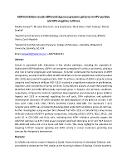ASPH inhibition reveals differential gene expression patterns in HPV-positive and HPV-negative cell lines
Abstrakt
Cancer is associated with alterations in key cellular pathways, including the aspartate β-hydroxylase (ASPH) pathway. ASPH is an oncogene upregulated in various carcinomas, playing a vital role in tumor progression and metastasis. To better understand the mechanisms of ASPH oncogenicity, we examined the effect of ASPH inhibition on human papillomavirus (HPV)-positive (CRL-3240, HeLa) and HPV-negative (FaDu, MCF-7) cell lines. Inhibition of ASPH's catalytic activity using the small molecule inhibitor MO-I-1151 resulted in a significant reduction in proliferation, migration, and invasiveness of tumor cell lines. Transcriptomic analysis via bulk RNA sequencing identified 2387 and 2350 differentially expressed genes in hypoxic and normoxic conditions, respectively, compared to controls. Significant downregulation was observed in genes (1460 in hypoxia and 1325 in normoxia) regulating the cell cycle, DNA replication, and epithelial-mesenchymal transition. RT-qPCR validated the downregulation of key genes in at least 3 cell lines (IL7R, LY6D, LY6E, LY6K, TRIP13, SUV39H1, ELAVL2, WNT10B). The interleukin 7 (IL7) receptor gene (IL7R) was consistently downregulated under both conditions across all cell lines. Further investigation using western blot showed that MO-I-1151 or tofacitinib (a Janus kinase inhibitor) reduced JAK/STAT pathway components, including JAK2/3, STAT5, BCL2, MCL1, and cyclin D1 in CRL-3240 and HeLa cells, indicating that ASPH inhibition primarily targets the JAK/STAT pathway via IL7R. ELISA assays revealed significant decreases in IL7 and TSLP levels in CRL-3240 and FaDu, but not in HeLa and MCF-7 cells. This study highlights the potential for targeting IL7/TSLP receptor signaling and ASPH activity in cancer treatment, providing new avenues for therapeutic intervention.
Klíčová slova
ASPH: HPV, inhibition, cancer
Trvalý odkaz
https://hdl.handle.net/20.500.14178/2756Licence
Licence pro užití plného textu výsledku: Creative Commons Uveďte původ 4.0 International





